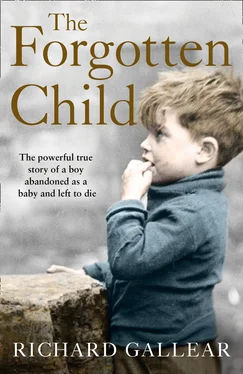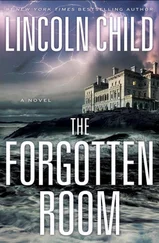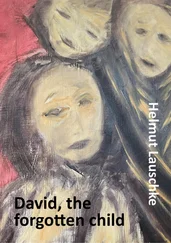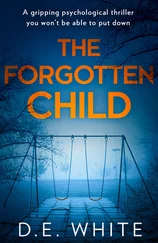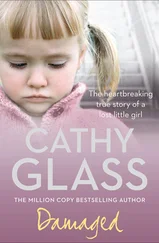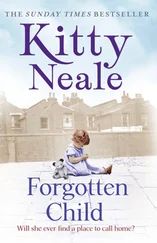As I approached four, I became more aware of the beauty of Field House, both inside and out. It was a classical design – Georgian, I think. Through the elegant porch and the huge front door was a beautiful hallway that stretched so far ahead, it seemed to me to go on for ever. There was oak panelling along the left-hand side and an old oak sideboard. A huge chandelier reflected the light in the centre of the hall and to the right was a grand oak staircase with beautiful carved banisters and turned finials, polished to a high sheen. In fact, it was the sweet smell of beeswax polish that pervaded the whole house. When I stood at the bottom of the stairs and craned my neck, I could see all the way up the staircase as it curved round and round the squares of space, through each floor, creating a pyramid effect, at the top of which was a beautiful painted ceiling. Every landing was surrounded by huge oak doors and the only light flooded down from skylights at the very top.
‘You must never go up those stairs,’ I remember Matron telling us one day. It was an order. But, on one occasion, looking upwards, I began to wonder what was on the upper floors. It was just curiosity, but almost involuntarily, I found myself climbing up the first flight of stairs. Halfway up, I realised what I had done and looked over the banisters, but there was nobody in sight, just distant sounds from the kitchens. Everybody else seemed to be outside, so I tiptoed on up the polished treads to the first landing. There were doors everywhere, all of them closed. I was desperate to go and see what was inside one of the rooms, but I didn’t dare – somebody might be lurking behind, ready to pounce on me. I dreaded to think what my punishment would be. I turned to go back down, but it was too late.
One of the doors opened and Matron herself came out.
‘What are you doing here?’ she asked in her sternest voice as she towered over me.
I could barely get the words out. ‘S-s-sorry Matron …’
‘You know you’re not supposed to be up here?’
‘Yes, Matron.’ I hung my head, expecting the worst.
‘Well, go straight back down those stairs and never come up here again. Do you understand?’
‘Y-y-yes Matron. I’m sorry.’
She was pointing at the stairs, so I began to clamber down them as quickly as I dared, until my housemother arrived and took my hand to help me down the rest and sent me out to play with the others on the grass.
Later, at bedtime, she kindly reinforced the message, as Matron had probably asked her to do. But she said it with a tolerant smile.
‘I’m sure you were just curious,’ she said.
‘Yes, I only wanted to see …’
‘There’s nothing much up there,’ she explained. ‘Just offices, staff bedrooms and lots of cupboards, where we keep the clothes and sheets and things.’
I nodded. I couldn’t help being inquisitive and adventurous, which did lead me into other tricky situations from time to time, but I never ventured up the stairs again.
The sleeping arrangements at Field House were very straightforward. Being such a grand house, all the downstairs rooms were very large, with high ceilings and long sash windows, letting in generous beams of light. The babies were all in a room beyond the staircase, in their cots.
The first door to the left of the front door led into the girls’ dormitory, which I never saw inside. The boys’ dormitory was the same but opposite, to the right of the front door and looking out over the front lawns. There were usually about 10 to 12 of us in there, our little metal-framed beds placed at intervals around the walls of the room, with tables and chairs in the centre for us to play at if the weather was bad, though in my memories it hardly ever was. The room itself had been stripped bare of its grandeur and painted white, but it still had its wooden floors and the ceiling’s decorative cornices. There were full-length curtains at every window.
My bed was by the window at the far side of the room, so I had a remarkable view in the daylight, but there were no lights outside, which made it so dark at night that it seemed almost haunted. I was glad then that I wasn’t alone.
Although most of the staff slept on the upper floors, they were always alert for any problems with the children – I suppose some of them might have been on night duty. I know they were there for us because one night the rain was pouring down in torrents, beating against the windows so hard that it kept us all awake for a while. Finally, I must have dozed off, perhaps for an hour or two. Suddenly I awoke to a great flash of lightning, followed immediately by loud thunder cracks that must have struck very close by. At first, I feared it had broken our windows, but they were still intact. I grabbed hold of my scruffy old second-hand teddy bear, Jeffrey, and hugged him tight. The lightning lit up the room again and again with crashing roars, which terrified us all. I hid myself and Jeffrey under the covers. Only moments after this crescendo, my housemother and two of the others rushed into our room and straight away, comforted us all, gathering us together in little groups and calming us down.
Sometimes, on more peaceful nights, I would hear the sounds of animals outside, such as badgers or foxes making their way round to the back of the building, where the hens were kept, but I don’t remember them ever catching any, though the staff probably wouldn’t have told us if they had. Often, I used to wake early and peep out to watch the stately deer or the rabbits and hares scampering across the lawns.
Any toys or games we had were donated by well-wishers, so they had often been well used. As well as Jeffrey, I also had two toy cars. I used to play with them a lot, pushing and spinning them round while making the noise of a car, and I would park them under my bed every night.
When the weather was bad, we played in our dormitories, the girls in theirs and we boys in ours. We had a big bag of little blocks of wood and I used to piece them together to make shapes and patterns. Sometimes we built towers. I remember going upwards as far as I could before they all crashed to the floor.
We also had colouring books and crayons, which we enjoyed. On Sundays we set out all the little Formica-topped tables and chairs in the middle of the room and were given watercolour paints in little tins, one each. We had to get the water to wet the paints with our brushes to colour in the pictures or make our own. I loved that. The staff would come round and say things like: ‘Oh, that’s very good’, or ‘What colour are you going to paint this?’
I used to love our painting on Sundays – I’m sure that’s what started my love of art growing up.
As you have probably guessed by now, mealtimes were always my favourite time of the day. We sometimes ate breakfasts and teas in our dormitories, but we always had our lunch in the big dining room at the back of the house, all seated at long refectory tables – the boys at one and the girls at the other, with a housemother at each end. We had to say Grace at the beginning of every meal:
‘ For what we are about to receive, may the Lord make us truly thankful. Amen .’
We were encouraged to eat everything on our plates, but I didn’t need much encouragement – the food was so good, I don’t think I ever left anything! We were allowed second helpings if there were any and I always had them.
Next to our dormitory there was a bathroom, with a black and white tiled floor. I remember there was one bath in it – a big white iron affair. That was on one side and along the opposite wall was a row of wash basins. We would line up and wash our hands before every meal, then at bedtime we would brush our teeth, wash our faces and hands. The housemothers watched us to make sure we did this thoroughly before we got into bed. As there was only the one bath, we had to take turns every two or three days.
Читать дальше
